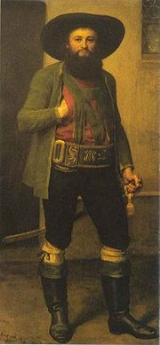
Andreas Hofer
Encyclopedia
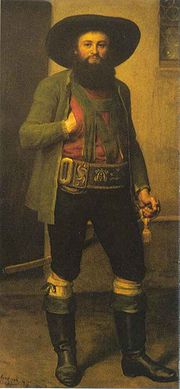
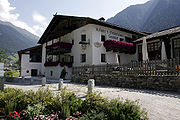
German Tyrol
German Tyrol is a historical region in the Alps now divided between Austria and Italy. It includes largely ethnic German areas of historical County of Tyrol: the Austrian state of Tyrol and the province of South Tyrol but not the largely Italian-speaking province of Trentino .-History:German...
ean innkeeper and patriot
Patriotism
Patriotism is a devotion to one's country, excluding differences caused by the dependencies of the term's meaning upon context, geography and philosophy...
. He was the leader of a rebellion against Napoleon
Napoleon I of France
Napoleon Bonaparte was a French military and political leader during the latter stages of the French Revolution.As Napoleon I, he was Emperor of the French from 1804 to 1815...
's forces.
He was an innkeeper turned politician who fought for Austria against the French during the War of the Third Coalition. In 1809, he became the leader of a rebellion against Franco-Bavarian forces that sparked the War of the Fifth Coalition
War of the Fifth Coalition
The War of the Fifth Coalition, fought in the year 1809, pitted a coalition of the Austrian Empire and the United Kingdom against Napoleon's French Empire and Bavaria. Major engagements between France and Austria, the main participants, unfolded over much of Central Europe from April to July, with...
. He was subsequently captured and executed.
Early life
Andreas Hofer was born 1767 in St. Leonhard in PasseierSt. Leonhard in Passeier
St Leonhard in Passeier is a comune in the Passeier Valley in South Tyrol, northern Italy, located about 80 km north of Trento and about 35 km north of Bolzano .-Geography:...
, County of Tyrol
County of Tyrol
The County of Tyrol, Princely County from 1504, was a State of the Holy Roman Empire, from 1814 a province of the Austrian Empire and from 1867 a Cisleithanian crown land of Austria-Hungary...
. His father was an innkeeper of the Sandhof inn and Andreas followed in his footsteps when he inherited the establishment. He also traded wine and horses in northern Italy and learned the language. He married Anna Ladurner. In 1791 he was elected into the Tyrolean Landtag
Landtag
A Landtag is a representative assembly or parliament in German-speaking countries with some legislative authority.- Name :...
. In dialectical German he was known as a "wirt" (innkeeper) and thus ever after "The Sandwirt."
In the war of the Third Coalition
Third Coalition
The War of the Third Coalition was a conflict which spanned from 1803 to 1806. It saw the defeat of an alliance of Austria, Portugal, Russia, and others by France and its client states under Napoleon I...
against the French he became a sharpshooter and later a militia
Militia
The term militia is commonly used today to refer to a military force composed of ordinary citizens to provide defense, emergency law enforcement, or paramilitary service, in times of emergency without being paid a regular salary or committed to a fixed term of service. It is a polyseme with...
captain. When Tyrol was transferred from Austria
Austria
Austria , officially the Republic of Austria , is a landlocked country of roughly 8.4 million people in Central Europe. It is bordered by the Czech Republic and Germany to the north, Slovakia and Hungary to the east, Slovenia and Italy to the south, and Switzerland and Liechtenstein to the...
to Bavaria
Bavaria
Bavaria, formally the Free State of Bavaria is a state of Germany, located in the southeast of Germany. With an area of , it is the largest state by area, forming almost 20% of the total land area of Germany...
(France's ally) in the Treaty of Pressburg in 1805, Hofer became a leader of the anti-Bavarian movement. In January 1809, he was part of a delegation to Vienna
Vienna
Vienna is the capital and largest city of the Republic of Austria and one of the nine states of Austria. Vienna is Austria's primary city, with a population of about 1.723 million , and is by far the largest city in Austria, as well as its cultural, economic, and political centre...
to ask Emperor
Emperor of Austria
The Emperor of Austria was a hereditary imperial title and position proclaimed in 1804 by the Holy Roman Emperor Francis II, a member of the House of Habsburg-Lorraine, and continually held by him and his heirs until the last emperor relinquished power in 1918. The emperors retained the title of...
Francis II
Francis II, Holy Roman Emperor
Francis II was the last Holy Roman Emperor, ruling from 1792 until 6 August 1806, when he dissolved the Empire after the disastrous defeat of the Third Coalition by Napoleon at the Battle of Austerlitz...
of Austria for support for a possible uprising. The Emperor gave his assurances and the delegation returned home.
Hofer begun to secretly organize insurrection, visiting villagers and holding councils of war in local inns. Reputedly he was so much on the move that he signed his messages "Andreas Hofer, from where I am" and letters to him were addressed to "wherever he may be". At the same time other leaders organized their own forces elsewhere in the Alps. Hofer became a leader of a militia contingent in Passeier Valley
Passeier Valley
The Passeier Valley is the valley of the Passer river, in the mountains of South Tyrol, northern Italy. The Passer river is a left-bank tributary to the Adige. At the mouth of the valley, where the two rivers join, stands the town of Meran...
.
Armed rebellion begins

Rebellion
Rebellion, uprising or insurrection, is a refusal of obedience or order. It may, therefore, be seen as encompassing a range of behaviors aimed at destroying or replacing an established authority such as a government or a head of state...
began on April 9, 1809. The previous night organizers dumped sacks of sawdust into the River Inn as a sign to start the rebellion. When the sawdust floated through Innsbruck and to the Inntal, it alerted the rebels. Village bells summoned men to fight with muskets and farmyard implements. They soon overran smaller Bavarian garrisons and surprised a column of French infantry that was passing through the area.
On April 11 Tyrolean militia defeated a Bavarian force in Sterzing
Sterzing
Sterzing is a comune in South Tyrol in the region of Trentino-Alto Adige/Südtirol, Italy. It is the main village of the southern Wipptal, and the Eisack River flows through the medieval town.-Origin:...
which led to the occupation of Innsbruck
Innsbruck
- Main sights :- Buildings :*Golden Roof*Kaiserliche Hofburg *Hofkirche with the cenotaph of Maximilian I, Holy Roman Emperor*Altes Landhaus...
before noon. When the French and Bavarians counterattacked the next night, the Tyroleans fought them in the city until the Tyroleans won on the morning of the 13th. Hofer and his allies advanced south, taking Bozen and Trent
Trento
Trento is an Italian city located in the Adige River valley in Trentino-Alto Adige/Südtirol. It is the capital of Trentino...
.
Hopes of a successful rebellion waned when Napoleon defeated the Austrian forces of Archduke Charles of Austria. Austrian troops withdrew from Tyrol and Hofer pulled back to the mountains. The Bavarians reoccupied Innsbruck on May 19, but when Napoleon's troops left, the rebellion flared again.
Hofer takes command
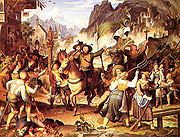
In the first and second Battles of Bergisel
Battles of Bergisel
The Battles of Bergisel were four battles fought between the forces of Emperor Napoleon I of France and the Kingdom of Bavaria against Tyrolean militiamen and a contingent of Austrian regular soldiers at the Bergisel hill near Innsbruck...
on May 25 and May 29 Hofer's troops again defeated the Bavarians and drove them out of the country. Hofer's troops retook Innsbruck on May 30.
On May 29 Hofer received a letter from Emperor Francis in which he promised not to sign any peace treaty that would include giving up Tyrol. An Austrian intendant
Intendant
The title of intendant has been used in several countries through history. Traditionally, it refers to the holder of a public administrative office...
came to rule Tyrol and Hofer returned to his home.
Napoleon defeated Austrian troops in the Battle of Wagram
Battle of Wagram
The Battle of Wagram was the decisive military engagement of the War of the Fifth Coalition. It took place on the Marchfeld plain, on the north bank of the Danube. An important site of the battle was the village of Deutsch-Wagram, 10 kilometres northeast of Vienna, which would give its name to the...
on July 6. On July 12 the Armistice of Znaim
Armistice of Znaim
The Armistice of Znaim was a ceasefire agreed between Archduke Charles and Napoleon I on 12 July 1809 following the Battle of Znaim, effectively ending hostilities between Austria and France in the War of the Fifth Coalition....
ceded Tyrol to Bavaria again. Napoleon sent 40,000 French and Bavarian troops to take over Tyrol and they reoccupied Innsbruck.
After little hesitation, Hofer joined battle again. The French offered a reward for his head. On August 13-14, his Tyroleans defeated the French troops of Marshal François Joseph Lefebvre
François Joseph Lefebvre
François Joseph Lefebvre, First Duc de Dantzig was a French military commander during the Revolutionary and Napoleonic Wars and one of the original eighteen Marshals of the Empire created by Napoleon....
, in the third of the Battles of Bergisel
Battles of Bergisel
The Battles of Bergisel were four battles fought between the forces of Emperor Napoleon I of France and the Kingdom of Bavaria against Tyrolean militiamen and a contingent of Austrian regular soldiers at the Bergisel hill near Innsbruck...
, in a 12-hour battle after a downhill charge. The Tyroleans retook Innsbruck.
Hofer declared himself Imperial Commandant of the Tyrol in the absence of the ruler and for two months ruled the land from Hofburg in the name of the Emperor of Austria. He announced new laws and taxes and minted his own coins. He also sent two men to Britain to ask for assistance. On September 29 he received a medal from the emperor and another promise that Austria would not abandon Tyrol.
Hofer's hopes were dashed on October 14 when the Treaty of Schönbrunn
Treaty of Schönbrunn
The Treaty of Schönbrunn , sometimes known as the Treaty of Vienna, was signed between France and Austria at the Schönbrunn Palace of Vienna on 14 October 1809. This treaty ended the Fifth Coalition during the Napoleonic Wars...
again ceded Tyrol to Bavaria. French and Bavarian troops advanced and Hofer retreated to the mountains. Promised amnesty
Amnesty
Amnesty is a legislative or executive act by which a state restores those who may have been guilty of an offense against it to the positions of innocent people, without changing the laws defining the offense. It includes more than pardon, in as much as it obliterates all legal remembrance of the...
, Hofer and his followers laid down their weapons November 8. Hofer retreated to his home valley.
Final attempt and capture
On November 12, Hofer received false reports of Austrian victories and tried to summon his troops on November 15. This time he had little following and French troops defeated his forces. His subordinate commanders surrendered and asked him to escape over the mountains.Hofer hid in a hut in the mountains in the Passeiertal and the French announced a reward of 1500 guilder
Guilder
Guilder is the English translation of the Dutch gulden — from Old Dutch for 'golden'. The guilder originated as a gold coin but has been a common name for a silver or base metal coin for some centuries...
s for his head. His neighbor Franz Raffl betrayed him and revealed his hiding place to the authorities; Hofer was captured by Italian troops on January 19, 1810. He was sent to Mantua
Mantua
Mantua is a city and comune in Lombardy, Italy and capital of the province of the same name. Mantua's historic power and influence under the Gonzaga family, made it one of the main artistic, cultural and notably musical hubs of Northern Italy and the country as a whole...
in chains to face a court martial. Raffl died impoverished in Bavaria
Bavaria
Bavaria, formally the Free State of Bavaria is a state of Germany, located in the southeast of Germany. With an area of , it is the largest state by area, forming almost 20% of the total land area of Germany...
20 years later.
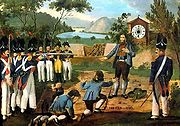
Court martial and execution
Officers holding the court martial disagreed on the exact sentence until they received a message from Milan. It was supposedly from the Viceroy, transmitting Napoleon's order to "give him a fair trial and then shoot him." Later Napoleon claimed to Prince MetternichKlemens Wenzel von Metternich
Prince Klemens Wenzel von Metternich was a German-born Austrian politician and statesman and was one of the most important diplomats of his era...
that Hofer was executed against his wishes.
Andreas Hofer was executed by a firing squad
Execution by firing squad
Execution by firing squad, sometimes called fusillading , is a method of capital punishment, particularly common in the military and in times of war.Execution by shooting is a fairly old practice...
on February 20, 1810. He refused a blindfold
Blindfold
A blindfold is a garment, usually of cloth, tied to one's head to cover the eyes to disable the wearer's sight. It can be worn when the eyes are in a closed state and thus prevents the wearer from opening them...
and gave money to a corporal in charge, telling him to "shoot straight". Hofer became a martyr
Martyr
A martyr is somebody who suffers persecution and death for refusing to renounce, or accept, a belief or cause, usually religious.-Meaning:...
in Germany and Austria and a rallying point against the power of Napoleon.
Legacy and monuments
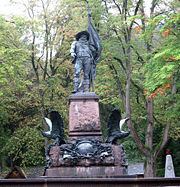
Emperor of Austria
The Emperor of Austria was a hereditary imperial title and position proclaimed in 1804 by the Holy Roman Emperor Francis II, a member of the House of Habsburg-Lorraine, and continually held by him and his heirs until the last emperor relinquished power in 1918. The emperors retained the title of...
. In 1823, Hofer's remains were moved from Mantua to Innsbruck, and in 1834, his tomb was decorated with a marble statue. In 1893, a bronze statue of Hofer was erected in Bergisel (Innsbruck
Innsbruck
- Main sights :- Buildings :*Golden Roof*Kaiserliche Hofburg *Hofkirche with the cenotaph of Maximilian I, Holy Roman Emperor*Altes Landhaus...
). There is a large painting depicting his arrest which hangs in the Palace of Maria Theresa in Innsbruck. There is an annual open-air play in Meran based on his life.
The song Zu Mantua in Banden
Zu Mantua in Banden
Zu Mantua in Banden is one of the most popular folk songs and, since 1948, the official anthem of the current Austrian State of Tyrol, i.e. the Northern and Eastern part of the former County of Tyrol...
(today the anthem of the State of Tyrol) tells the story of his tragic fate and execution.
Literature
- Andreas Hofer an historical novel by Luise Mühlbach, 1871

